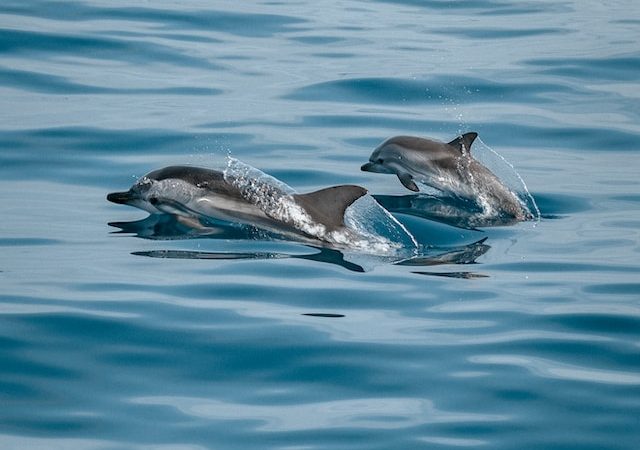Introduction: In the vast expanses of our oceans, dolphins play a crucial role as keystone species, exerting a significant influence on marine ecosystems. These intelligent and charismatic creatures not only captivate our imaginations but also contribute to the balance and health of their habitats. In this article, we delve into the invaluable role dolphins play
Introduction: In the vast expanses of our oceans, dolphins play a crucial role as keystone species, exerting a significant influence on marine ecosystems. These intelligent and charismatic creatures not only captivate our imaginations but also contribute to the balance and health of their habitats. In this article, we delve into the invaluable role dolphins play in marine ecosystems and highlight the importance of their conservation and preservation.
I. Apex Predators: Regulating Prey Populations: Dolphins occupy a position at the top of the food chain as apex predators, exerting control over prey populations. By preying on a variety of fish, squid, and crustaceans, dolphins help regulate the abundance of these species, preventing overpopulation and maintaining the ecological balance within their habitats. Their feeding habits ensure the health and diversity of marine ecosystems.
II. Indicators of Ecosystem Health: Dolphins can serve as indicators of the overall health and well-being of marine environments. As highly mobile animals, they traverse vast distances, interacting with various habitats along their migratory routes. Changes in dolphin populations, their behaviors, or their overall condition can provide valuable insights into the state of the marine ecosystem, including factors such as pollution, habitat degradation, or overfishing.
III. Nutrient Cycling: Fostering Marine Productivity: Dolphins contribute to nutrient cycling within marine ecosystems. Through their feeding activities, they consume prey items and excrete waste, releasing nutrients back into the water. These nutrients fuel the growth of phytoplankton and other primary producers, initiating the marine food web. By stimulating productivity, dolphins play a vital role in maintaining the overall health and abundance of marine life.
IV. Seed Dispersal: Facilitating Seagrass and Coral Restoration: Dolphins also aid in the dispersal of seeds of marine plants, such as seagrasses and certain types of algae. As they navigate through seagrass meadows and coral reefs, they inadvertently transport seeds attached to their bodies or within their digestive system. This unintentional act of seed dispersal helps propagate and restore crucial habitats, fostering the growth and sustainability of marine biodiversity.
V. Cultural Significance and Ecotourism: Dolphins hold significant cultural value, captivating the hearts and minds of people worldwide. Their presence in coastal communities often serves as a draw for ecotourism, attracting visitors eager to observe and appreciate these magnificent creatures. Well-managed and responsible ecotourism can contribute to local economies, promote environmental education, and raise awareness about the importance of conserving marine ecosystems.
VI. Conservation Efforts and Ethical Considerations: Preserving the role of dolphins in marine ecosystems necessitates robust conservation efforts. Protecting their habitats through the establishment of marine protected areas, implementing sustainable fishing practices, and reducing pollution are vital steps toward safeguarding these keystone species. Additionally, ethical considerations surrounding human interactions with dolphins, such as responsible whale watching and avoiding activities that disrupt their natural behaviors, are essential for their well-being and long-term conservation.
Conclusion: Dolphins play a pivotal role in the delicate balance of marine ecosystems. As apex predators, they regulate prey populations, contribute to nutrient cycling, and facilitate the restoration of vital habitats. Recognizing their importance and promoting their conservation is not only crucial for the survival of dolphins themselves but also for the health and sustainability of our oceans. Let us champion the preservation of these remarkable creatures, ensuring their continued role as guardians of the seas for generations to come.

















Leave a Comment
Your email address will not be published. Required fields are marked with *